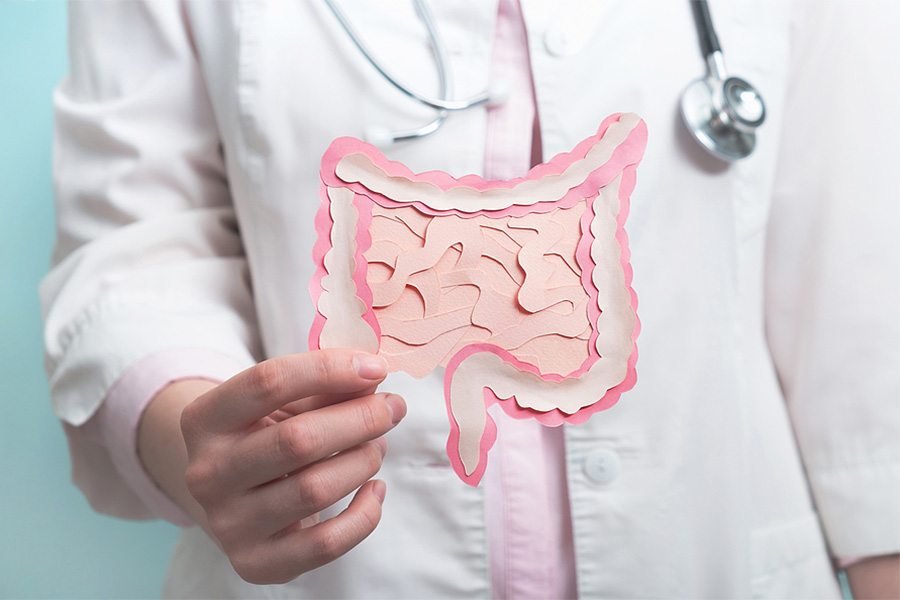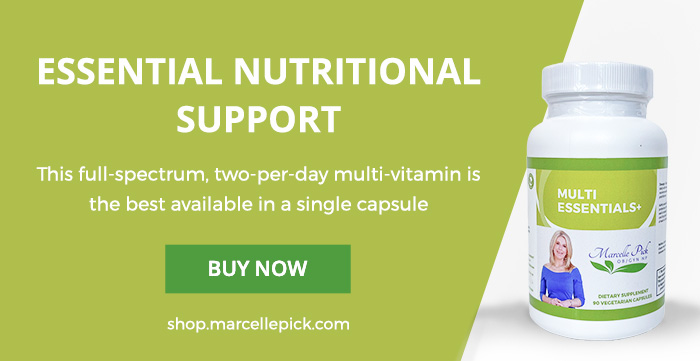Updated 01/22/2023
When I asked some of my closest friends if they knew what the estrobolome was, their answers sounded like a game of Balderdash.
A new amusement park ride? The puff of powder released when putting on latex gloves? A Polish bread served at Easter? An indoor commune of women, housed under a tent-like structure? A women’s health condition related to low levels of certain hormones?
While some of their answers were intentionally silly, this last one wasn’t too far off; the estrobolome does relate to hormones.
Basically, the estrobolome is a collection of bacteria within your gut microbiome that can modulate and affect estrogen.
That might sound complicated at first, but it’s really worth digging into and understanding. Let’s take a closer look at what estrobolome is, and how it connects to the gut and hormonal balance. Once you understand the relationship, I’ll give you some ideas for keeping your gut microbiome (including the estrobolome) healthy.
What is the estrobolome?
Researchers Claudia Plottel and Martin Blaser defined the estrobolome as “the aggregate of enteric bacterial genes whose products are capable of metabolizing estrogens.” In less scientific terms, that means the collective bacteria that can convert estrogen to its active form.
I think it’s important for women to understand what the estrobolome is and how it can impact their health. Most are aware of the way fluctuating hormones can make them feel. They’ve experienced ups and downs around their menstrual cycle, and any perimenopausal or menopausal woman who can tell you all about hot flashes, mood swings, and other uncomfortable symptoms.
Estrogen imbalance can not only be behind these symptoms, it’s also connected to a number of serious health conditions. And it’s crucial to understand that the balance in your gut has a big impact on your estrogen levels.
Estrogen and the Gut
It may seem odd, but though estrogen is produced mainly by the ovaries and adrenals, levels are regulated primarily in your gut. That means that if your gut is out of balance, this important hormone may also be skewed.
Research is expanding in this area all the time. One review explored the way that the estrobolome might impact risk of developing postmenopausal estrogen receptor-positive breast cancer. Looking at the composition and activities of the estrobolome in healthy individuals as well as women with estrogen-driven breast cancer could lead to development of microbiome biomarkers and interventions to mitigate cancer risk, the authors said.
The estrobolome regulates circulating estrogen, as well as excreted estrogen levels. Microbes produce an enzyme, beta-glucuronidase, which converts estrogens to their active forms. This estrogen produced by beta-glucuronidase can bind to receptors and impact certain physiological processes. If the gut is well balanced, beta-glucuronidase activity is normal. But when dysbiosis (imbalance) occurs, levels of estrogen can become too high or low, increasing risk of estrogen related disease.
When estrogen is metabolized by the liver, it’s then sent to bile to be excreted into the gut. When the estrobolome is healthy, this estrogen is safely removed as waste. But when dysbiosis is present, estrogen can be reabsorbed into the bloodstream causing estrogen dominance. This can lead to a wide range of health issues.
Estrogen related disease and microbiome balance
There are three types of estrogen produced by a woman’s body: Estrone (E1), Estradiol(E2) and Estriol (E3). Each influences different tissues and functions in the body. E2 is the dominant form of estrogen before menopause, while after menopause E1 becomes the dominant circulating estrogen. E3 is the least potent estrogen, but is dominant during pregnancy. All types interact with each other so it’s important to give attention to the overall balance of each form.
Estrogen regulates many processes in the body, including female reproductive function, body fat deposition, cardiovascular health, burn turnover, and replication of cells. Reduction of circulating estrogen can block healthy functioning, leading to a long list of problems, including obesity, metabolic syndrome, cancer, endometriosis, endometrial hyperplasia, PCOS, cardiovascular disease, osteoporosis, fertility, and cognitive function. Did you realize estrogen could impact so many conditions beyond reproduction? Many women don’t.
Research has shown that imbalances in the gut can increase risk or exacerbate symptoms of these conditions. Patients with obesity, cardiovascular disease, and osteoporosis have all shown a high prevalence of gut dysbiosis.
When circulating estrogen declines, osteoclastic activity rises which results in bone resorption and decreased bone strength. Given certain bacteria to mice who had undergone ovariectomies has been shown to improve bone formation and reduce bone resorption. Other studies have shown similar positive effects with the introduction of specific bacteria.
Estrogen can also change the bacterial makeup in both the urinary tract and vagina, causing infections. As estrogen decreases, so too can Lactobacilli, since estrogen stimulates growth of this valuable bacteria. Lactobacilli have several protective roles for women’s health, including maintaining the proper acidic environment and preventing the adhesion of undesirable bacteria.
Over the past two decades, research into the relationship between the gut microbiome and breast cancer has grown significantly. This research has demonstrated the key role that the gut microbiome has in regulating estrogen. Diversity in the gut is a critical element in overall health, including breast health. Research has shown that the microbiota is significantly different in patients with breast cancer as compared to control groups, including being much less diverse.
How everything is connected
The significant connection between hormonal health and the gut is really just one example of how just about everything in your body can be connected to what’s going on in your gut– and same goes with your hormones!
I’m happy to see that both in research and in culture, we’re recognizing this more and more. It’s by more deeply understanding connections like the estrobolome that we’re really going to make progress in treating the whole person as opposed to just their parts.
For example, a research review published in July 2022 zeroed in on the connections between estrogen, gut health, and skin health. And while at first glance these areas might all seem separate, it really makes perfect sense that they’re intertwined. If the gut microbiome influences estrogen production (and estrogen influences the gut microbiome), and both our hormones and our gut health affect our skin, then we should be looking at these things all together.
How can I tell when I have dysbiosis?
The signs of dysbiosis are fairly clear, but the symptoms can be caused by other conditions as well. Testing can help definitively determine the balance of bacteria in the body. Still, if you are experiencing the following symptoms, taking steps to heal your gut won’t hurt you – and it just might help!
Signs of an imbalanced gut microbiome include bloating, gas, diarrhea or constipation; changes in weight; sensitivity to certain foods; skin irritation; fatigue; hormonal imbalances; and autoimmune conditions.
What causes dysbiosis?
While there can be a number of root causes of dysbiosis, there are some that have been consistently found to negatively impact the bacterial makeup of the gut.
Antibiotics and hormonal contraceptives change both the gut microbiota and estrogen levels. Chronic infection can also lead to dysbiosis, so it’s a delicate balancing act between addressing those conditions with antibiotics when necessary, without going overboard and using them too often.
Diet has a significant effect on gut microbiota. A diet high in carbohydrates and processed foods can leave you more susceptible to dysbiosis due to nutrient deficiencies. Consumption of phytoestrogens in food has been found to change the gut microbiota and increase risk of estrogen-related diseases. Food allergies can also cause dysbiosis (and dysbiosis can cause food sensitivities, so it can be confusing to unravel).
Alcohol consumption, genetics, weight, age, and environmental toxins can all alter the composition of the gut microbiome and lead to dysbiosis.
I’d be remiss if I didn’t bring up stress. Stress can lead to serious health impacts, including dysbiosis. Stress can be real or perceived, physical or emotional, and everyone is impacted by it. It’s when stress becomes chronic that problems develop. Most people are familiar with physical reactions to stress (such as nausea before public speaking) but don’t realize that constant exposure to these reactions changes the balance of your gut.
Related article: Digestion & Dysbiosis
What you can do to heal dysbiosis and restore healthy estrogen levels
Now that you know how important a healthy gut is to estrogen balance, which is in turn vital to good health, what can you do to maintain the right balance? You’ve already taken the first step, just by learning more about it. Having the right information gives us more power to make informed lifestyle choices.
Gut balance relies on a healthy lifestyle. From dietary choices to exercise, stress reduction to targeted supplementation, we have control over so many factors that can reduce imbalances in the gut.
Here are some quick tips to help you make healthy choices for yourself (and your gut):
Dietary Changes
- Make good choices in what you are eating at least 80% of the time. A dessert every now and then is fine, but the more you avoid sugar, processed foods, and anything that may be causing you digestive distress (gluten and dairy are two common culprits) the better. A balanced diet that includes healthy fat, protein, and complex carbohydrates is key.
- Increase your intake of fermented foods, such as sauerkraut, kimchi, and kombucha to boost diversity and rebalance gut flora.
- Eat more prebiotic foods to encourage growth of beneficial bacteria. Some great options include asparagus, garlic, and bananas.
- High fiber plant-based foods, such as nuts, seeds, beans, legumes and vegetables support a healthy gut.
- Cruciferous vegetables like broccoli, cabbage and cauliflower help regulate the “good” bacteria and support healthy elimination of excess hormones, including estrogen. Just be sure to cook them first, since they can be behind thyroid imbalances when consumed raw.
Stress reduction
- Don’t let emotional issues fester. Address upset, both old and new, and release them so your body can let go too.
- Find joy in every day. The best way to relieve stress is to do something you love every single day. When you do, you don’t allow that stress to build up in your system. Dancing, reading, writing in a journal, playing an instrument, playing a game with family or friends, running…the options are limited only by your imagination!
- Get quality sleep to keep cortisol levels balanced and reduce stress on your body. A lot of work happens within your body as you sleep, so making sure you have an adequate amount of rest is vital to your health.
- Try meditation or mindful practices to help soothe your central nervous system.
Reduce Toxin Exposure
- Examine the labels of your beauty and cleaning products, and use all-natural products whenever possible.
- Avoid exposure to heavy metals.
- Eliminate the use of plastics for food and drink, particularly when heated.
- Eat organic food whenever you can to reduce exposure to pesticides.
Lifestyle Factors
- Give your body the support it needs. I suggest that all women take a high-quality multivitamin every day to avoid nutrient deficiencies. When dealing with dysbiosis, a probiotic can also be crucial for restoring proper balance to your gut. Prebiotics, either via supplements or food, feed the healthy bacteria.
- Limit alcohol consumption. Alcohol changes the composition of the microbiome and increases gut permeability.
- Keep your body moving. Exercise is great stress relief, and physical activity helps balance circulating levels of estrogen. It’s important, however, to keep activity levels appropriate. Too much (or too vigorous) exercise can cause your body undue stress.
Hormonal balance depends on a healthy estrobolome
Understanding the impact that a balanced gut has on health is the first step in maintaining appropriate hormonal balance, whatever stage of life you are in. A healthy lifestyle, stress management and good nutrition are all within your control. Now is the time to make simple changes for long lasting hormonal health!
References:
https://www.ncbi.nlm.nih.gov/pmc/articles/PMC9276867
https://www.mdpi.com/2079-7737/11/11/1683
https://pubmed.ncbi.nlm.nih.gov/28778332/
https://chopra.com/articles/the-estrobolome-how-the-gut-impacts-estrogen-levels-metabolism-and-more








